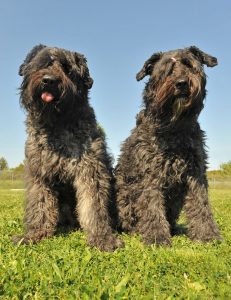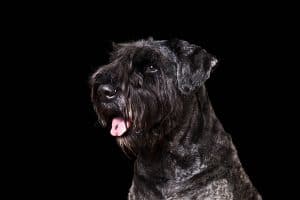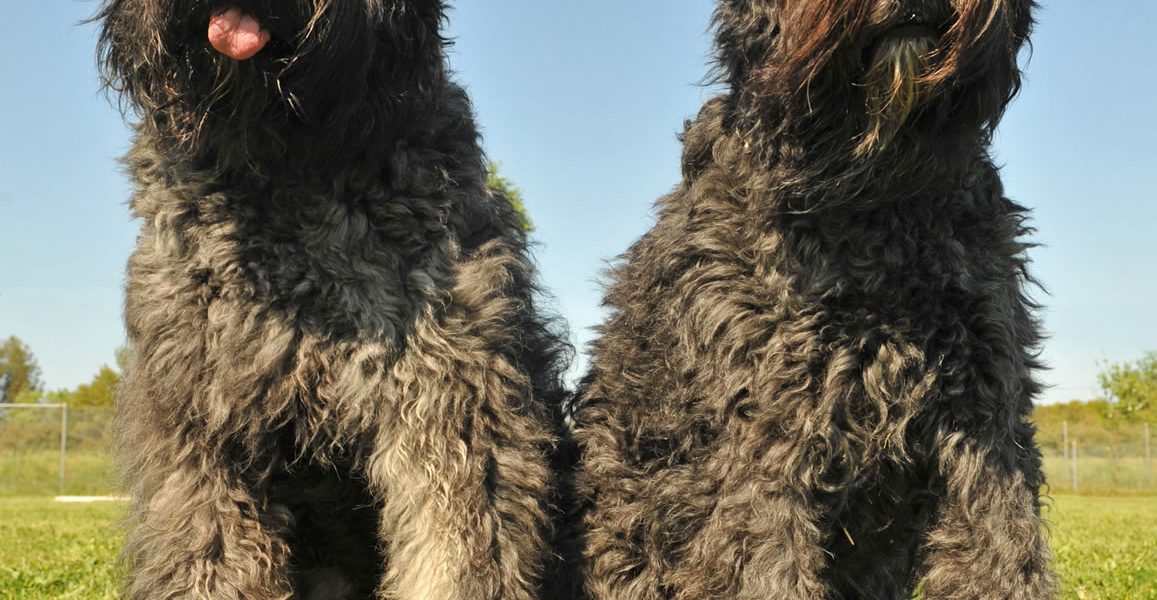 This breed, Bouvier des Flandres, was originally bred by monks in Flanders. The monks cross-bred foreign dogs like Irish Wolfhounds with local farm dogs until the breed came into its own. Because of their size, strength, and patient nature, this breed naturally lent itself to work. Their thick double coats also allowed them to stand up to the sometimes harsh weather conditions of their homelands.
This breed, Bouvier des Flandres, was originally bred by monks in Flanders. The monks cross-bred foreign dogs like Irish Wolfhounds with local farm dogs until the breed came into its own. Because of their size, strength, and patient nature, this breed naturally lent itself to work. Their thick double coats also allowed them to stand up to the sometimes harsh weather conditions of their homelands.
The breed faced much danger during both World War I and II. They were wiped out almost completely during World War I, and faced a similar fate during the Second World War. Thankfully, the breed survived, and in 1965 a standard breed was adopted.
Although Bourvier des Flandres seem small, they are very powerful dogs. Their fur is extremely thick and can be fawn, black, grey, or salt and pepper in color. A common misconception is that this breed does not shed. Unfortunately, this is not the case. Instead of getting on your couch or carpet, any stray bits of hair gets caught up in its coat. A weekly brushing and a monthly trim will help keep fallen hairs from matting.
This breed has a very distinctive head. The preferred manner of clipping the fur around the face results in what looks like a beard and a moustache. The eyebrows are very thick as well, giving the dog the appearance of mountain man!
Typically the ears and tail are docked. This comes from a long tradition of work – a dog with a long tail is more easily injured than a dog without one.
Hiding behind that thick, shaggy coat is a sweet natured, intelligent dog. Bouvier des Flandres are known to be very protective and loyal. They are very gentle, making them a great pet for a family with children. Their calm, even-tempered intelligence makes training easy. This alongside their protective nature makes them ideal for watchdogs
 Perhaps because of their calm, protective nature, Bouvier des Flandres tend to be a little wary of strangers. This usually presents itself in an aloof, non-aggressive attitude, but if a Bouvier des Flandres senses his family is in danger, he will do whatever he can to protect them. You can’t teach them to do this, nor can you teach them not to! Proper socialization is key with this breed – if brought to meet other puppies and people from a young age, they will get along well with dogs and strangers alike.
Perhaps because of their calm, protective nature, Bouvier des Flandres tend to be a little wary of strangers. This usually presents itself in an aloof, non-aggressive attitude, but if a Bouvier des Flandres senses his family is in danger, he will do whatever he can to protect them. You can’t teach them to do this, nor can you teach them not to! Proper socialization is key with this breed – if brought to meet other puppies and people from a young age, they will get along well with dogs and strangers alike.
Being a sturdy dog can be a disadvantage to a Bouvier des Flandres if health problems arise. They have a very high pain tolerance, which can make it difficult for a vet to find out what’s causing them trouble. They have a tendency towards hip dysplasia and cataracts.
Due to their intelligence and fondness for physical tasks, proper exercise is necessary with this breed. While they live happily in an apartment if taken on regular walks, they really do best in a large, fenced yard. When not presented with enough stimulation they’ll pick up habits you might not be so fond of, such as digging or barking.
Bourvier des Flandres are natural leaders. As such, it’s important to be able to demonstrate dominance from the beginning of training. If this dog senses he is the boss, he may become very over-protective.


